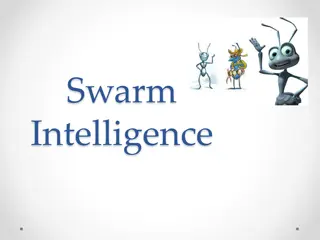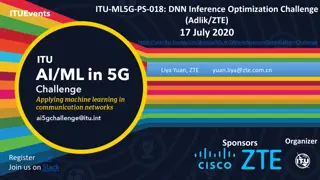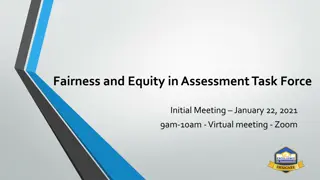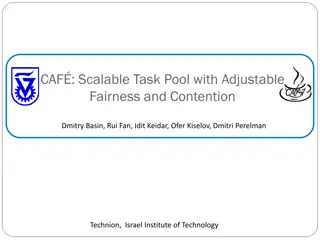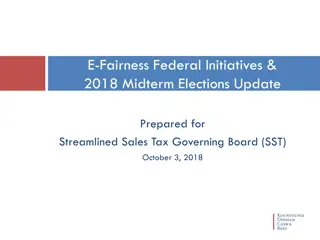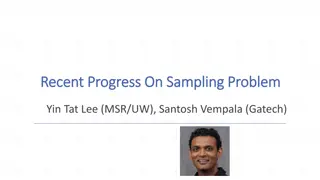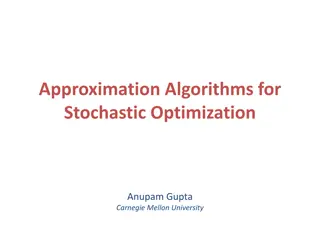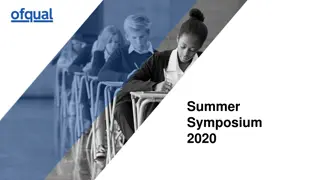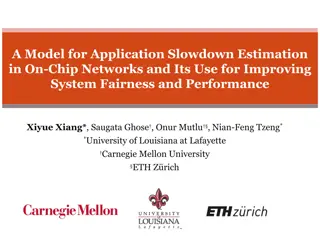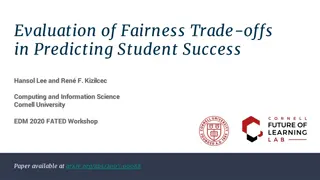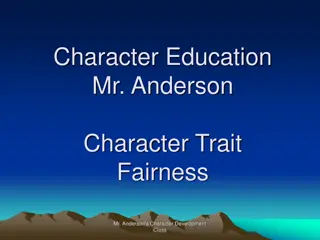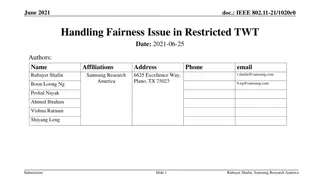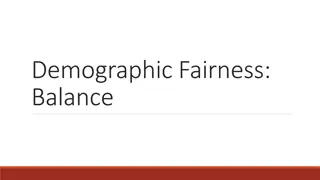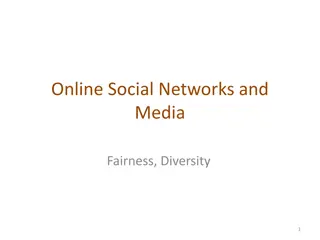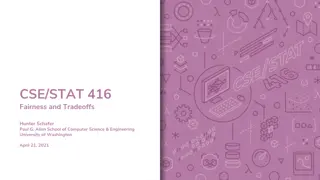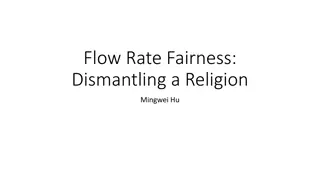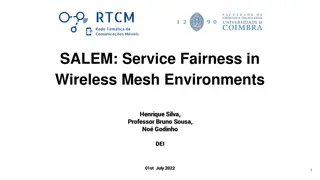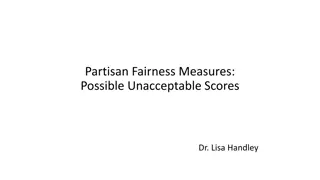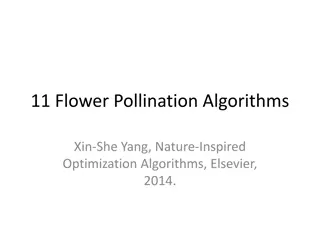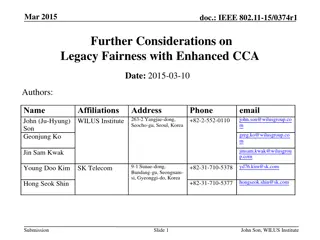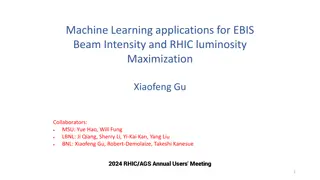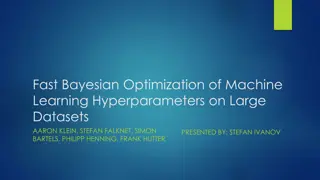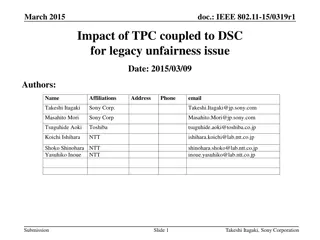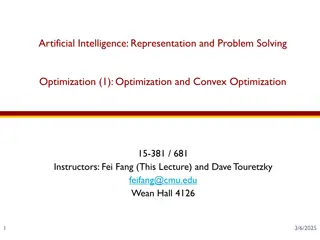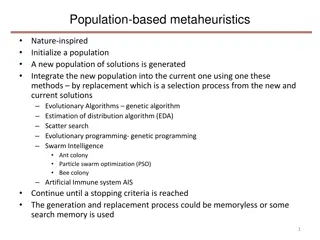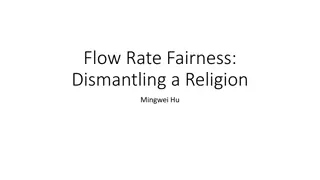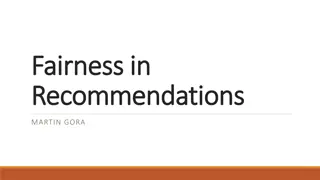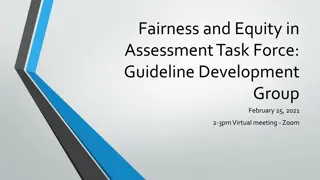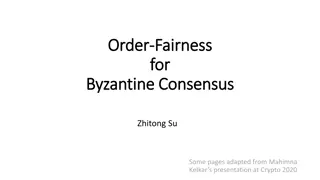Swarm Intelligence: Concepts and Applications
Swarm Intelligence (SI) is an artificial intelligence technique inspired by collective behavior in nature, where decentralized agents interact to achieve goals. Swarms are loosely structured groups of interacting agents that exhibit collective behavior. Examples include ant colonies, flocking birds,
4 views • 88 slides
DNN Inference Optimization Challenge Overview
The DNN Inference Optimization Challenge, organized by Liya Yuan from ZTE, focuses on optimizing deep neural network (DNN) models for efficient inference on-device, at the edge, and in the cloud. The challenge addresses the need for high accuracy while minimizing data center consumption and inferenc
1 views • 13 slides
Discrete Optimization in Mathematical Modeling
Discrete Optimization is a field of applied mathematics that uses techniques from combinatorics, graph theory, linear programming, and algorithms to solve optimization problems over discrete structures. This involves creating mathematical models, defining objective functions, decision variables, and
2 views • 12 slides
Fairness and Prejudice Through the FuF Game
Delve into themes of fairness, prejudice, and immigration through a unique game experience where players must navigate unclear rules and unfair treatment. Reflect on the parallels between the game and real-life situations faced by immigrants and newcomers to Canada, highlighting the importance of fa
0 views • 11 slides
Generalization of Empirical Risk Minimization in Stochastic Convex Optimization by Vitaly Feldman
This study delves into the generalization of Empirical Risk Minimization (ERM) in stochastic convex optimization, focusing on minimizing true objective functions while considering generalization errors. It explores the application of ERM in machine learning and statistics, particularly in supervised
2 views • 11 slides
Fairness and Equity in Assessment Task Force Meeting Overview
The Fairness and Equity in Assessment Task Force is committed to establishing guidelines to ensure fairness in assessment processes at the University of Florida. The task force members are tasked with developing models and guidelines for faculty and staff to promote equitable assessment practices. R
2 views • 29 slides
Scalable Task Pool with Adjustable Fairness
Explore CAF, a scalable task pool with adjustable fairness and contention, offering a solution to the inherent scalability problems of FIFO queues. The system allows for control over the level of relaxation, providing more fairness or less contention as needed. With a focus on bounded non-FIFO pools
5 views • 26 slides
Update on E-Fairness Federal Initiatives & 2018 Midterm Elections
The Supreme Court decision in South Dakota v. Wayfair has paved the way for states to require out-of-state sellers to collect and remit sales tax. Various federal legislative bills have been introduced in the 115th Congress regarding e-fairness. The Marketplace Fairness Act, S.976, aimed to establis
0 views • 36 slides
Insights into Recent Progress on Sampling Problems in Convex Optimization
Recent research highlights advancements in solving sampling problems in convex optimization, exemplified by works by Yin Tat Lee and Santosh Vempala. The complexity of convex problems, such as the Minimum Cost Flow Problem and Submodular Minimization, are being unraveled through innovative formulas
4 views • 47 slides
Approximation Algorithms for Stochastic Optimization: An Overview
This piece discusses approximation algorithms for stochastic optimization problems, focusing on modeling uncertainty in inputs, adapting to stochastic predictions, and exploring different optimization themes. It covers topics such as weakening the adversary in online stochastic optimization, two-sta
0 views • 33 slides
Embracing Fairness: Lessons from Leaders and Wilma Rudolph
Explore the inspirational stories of leaders and Wilma Rudolph, reflecting on fairness, equality, and compassion. Reflect on what we can learn, address unfairness in our world, and create a fair environment at school. End with a call to action for treating each other fairly every day by establishing
0 views • 13 slides
Insights from Summer Symposium 2020: Assessments, Fairness, and Results
The Summer Symposium 2020 provided valuable insights on various topics, including assessments, fairness in grading, and looking ahead to results in the education sector. Key discussions included the process of awarding grades, ensuring fairness for all students, and considerations for interpreting a
0 views • 48 slides
A Model for Application Slowdown Estimation in On-Chip Networks
Problem of inter-application interference in on-chip networks in multicore processors due to NoC contention causes unfair slowdowns. The goal is to estimate NoC-level slowdowns in runtime and improve system fairness and performance. The approach includes NoC Application Slowdown Model (NAS) and Fair
0 views • 25 slides
Evaluation of Fairness Trade-offs in Predicting Student Success
This study delves into fairness concerns in predicting student success, examining trade-offs between different measures of fairness in course success prediction models. It explores statistical fairness measures like demographic parity, equality of opportunity, and positive predictive parity. Through
0 views • 11 slides
Character Education: Understanding Fairness and Equity in Mr. Anderson's Class
Explore the core character traits of fairness and equity taught in Mr. Anderson's Character Development Class. Fairness is exemplified through impartial treatment, sharing, and abiding by rules. Equity involves correcting mistakes, not taking advantage of others, and ensuring fair shares. Discover k
0 views • 27 slides
Handling Fairness Issue in Restricted TWT Operation
Proposal addressing fairness vs. channel utilization tradeoff in restricted Target Wake Time (TWT) operation for IEEE 802.11 networks. Solution suggested for underutilization of TWT schedules due to early completion of latency-sensitive transmissions, mitigating fairness concerns while optimizing ch
0 views • 14 slides
Achieving Demographic Fairness in Clustering: Balancing Impact and Equality
This content discusses the importance of demographic fairness and balance in clustering algorithms, drawing inspiration from legal cases like Griggs vs. Duke Power Co. The focus is on mitigating disparate impact and ensuring proportional representation of protected groups in clustering processes. Th
0 views • 36 slides
Ensuring Fairness and Diversity in Online Social Networks and Media
Embracing fairness and diversity in online social networks and media is imperative to combat discrimination and biases. From addressing data correctness and completeness to understanding processing algorithms and disparate treatment, the quest for fairness through blindness and individual fairness i
0 views • 39 slides
Fairness and Tradeoffs in Machine Learning
Explore the concept of fairness in machine learning models and how biases can impact decision-making processes. Delve into various sources of bias and frameworks for understanding unintended consequences. Using college admissions as an example, discover different approaches to achieving group fairne
1 views • 32 slides
Challenges of Flow Rate Fairness in Network Resource Allocation
Addressing the concept of flow rate fairness in network resource allocation, this content explores its limitations and challenges. Despite being a goal in protocols like TCP, the practicality and enforceability of flow rate fairness are questioned. It highlights the inadequacy of flow rate as a meas
1 views • 15 slides
SALEM: Service Fairness in Wireless Mesh Environments
SALEM project focuses on managing resources intelligently in Wireless Mesh Networks to ensure fairness among services with heterogeneous technologies. Implementing a fairness model incorporating delay, reliability, and energy objectives, SALEM is tested in smart city scenarios. Through MILP optimiza
0 views • 11 slides
Analysis of Partisan Fairness Measures and Efficiency Gaps in Redistricting Plans
This analysis delves into partisan fairness measures and efficiency gaps in various redistricting plans challenged in Ohio, Pennsylvania, Wisconsin, and Michigan. Dr. Lisa Handley and other experts discuss thresholds for unconstitutional plans and the impact of lopsided margins. The Efficiency Gap,
0 views • 7 slides
Flower Pollination Algorithm: Nature-Inspired Optimization
Real-world design problems often require multi-objective optimization, and the Flower Pollination Algorithm (FPA) developed by Xin-She Yang in 2012 mimics the pollination process of flowering plants to efficiently solve such optimization tasks. FPA has shown promising results in extending to multi-o
2 views • 15 slides
Legacy Fairness Enhancement in IEEE 802.11 Networks: Further Considerations
Investigating legacy fairness issues in IEEE 802.11 networks, this document explores methods to address throughput starvation of legacy stations due to enhanced Channel Clear Assessment (CCA) in High Efficiency (HE) stations. Two fairness methods, Legacy Frame Protection and PPDU Size Reduction, are
0 views • 9 slides
Machine Learning Applications for EBIS Beam Intensity and RHIC Luminosity Maximization
This presentation discusses the application of machine learning for optimizing EBIS beam intensity and RHIC luminosity. It covers topics such as motivation, EBIS beam intensity optimization, luminosity optimization, and outlines the plan and summary of the project. Collaborators from MSU, LBNL, and
3 views • 23 slides
Fast Bayesian Optimization for Machine Learning Hyperparameters on Large Datasets
Fast Bayesian Optimization optimizes hyperparameters for machine learning on large datasets efficiently. It involves black-box optimization using Gaussian Processes and acquisition functions. Regular Bayesian Optimization faces challenges with large datasets, but FABOLAS introduces an innovative app
0 views • 12 slides
Redesigning Liver Distribution for Transplant Fairness
This article discusses the optimization of liver distribution to reduce waitlist deaths, improve fairness in organ allocation, and enhance transplant outcomes through redistricting and the use of statistical modeling. The focus is on creating optimized maps with specific parameters to ensure equitab
0 views • 13 slides
Impact of TPC Coupled to DSC for Legacy Fairness Issue
Legacy fairness is crucial for 11ax networks. This submission explores the use of TPC coupled to DSC to address the legacy unfairness issue and maintain system gain while ensuring fairness in SS3. The study evaluates how increasing Tx occasions and desired Rx occasions can recover legacy fairness fo
0 views • 20 slides
Machine learning optimization
Dive into the world of machine learning optimization with a focus on gradient descent, mathematical programming, and constrained optimization. Explore how to minimize functions using gradient descent and Lagrange multipliers, as well as the motivation behind direct optimization methods. Discover the
0 views • 16 slides
Artificial Intelligence: Representation and Problem Solving Optimization
This lecture explores optimization and convex optimization in the field of Artificial Intelligence, covering topics such as defining optimization problems, discrete and continuous variables, feasibility, and different types of optimization objectives. The content delves into the challenges and solut
0 views • 36 slides
Nature-Inspired Population-Based Metaheuristics and Optimization Techniques
This comprehensive guide delves into various population-based metaheuristics and nature-inspired optimization techniques such as evolutionary algorithms, swarm intelligence, and artificial immune systems. It covers concepts like genetic algorithms, ant colony optimization, particle swarm optimizatio
0 views • 6 slides
Networks Scheduling, Isolation, and Fairness
Learn about packet scheduling, fairness algorithms, and flow allocation techniques in computer networks. Explore concepts such as Max-Min Fairness, XCP protocol, and Weighted Fair Queueing for efficient network management. Get insights into how XCP routers compute feedback and ensure fairness among
0 views • 29 slides
Real Fairness in Resource Allocation: Debunking Flow Rate Fairness
Delve into the shortcomings of flow rate fairness in network resource allocation, exploring its inadequacies and impracticality. Discover why it fails to uphold real fairness and accountability, offering insights into alternative approaches for equitable distribution.
0 views • 15 slides
Understanding Discrete Optimization in Graph Theory
Explore the relationship between counting techniques, graph theory, and discrete optimization, with examples illustrating the transition from counting problems to optimization problems. Learn about applying optimization in scheduling and making graph models, as well as the role of graphs in discrete
2 views • 8 slides
Citizens' Perception of Peace Agreement Fairness and Spoiling Behavior
Explore the relationship between citizens' perceptions of peace agreement fairness and the potential for spoiling behavior in peace processes. Understand the implications, case studies, and insights related to citizens' reactions to peace agreements based on fairness. Theoretical frameworks and empi
0 views • 18 slides
Cut Mask Co-Optimization for Advanced BEOL Technology
Explore the ILP-based co-optimization of cut mask layout, dummy fill, and timing for sub-14nm BEOL technology. The proposed approach addresses self-aligned multiple patterning, cut process extension, and the impact of cut mask optimization on wire performance. Learn about related works, motivation,
0 views • 23 slides
Understanding Algorithmic Fairness in Recommendations
Explore the concept of fairness in algorithmic recommendations, focusing on removing biases from models to treat people equally. Learn about examples, challenges, and the importance of fairness in various applications.
0 views • 11 slides
Optimization Fundamentals and Applications
Explore the essentials of optimization with this PowerPoint presentation by Peggy Batchelor from Furman University. Learn how to recognize decision-making scenarios suitable for optimization modeling, formulate algebraic and spreadsheet models for linear programming problems, and use Excel's Solver
0 views • 33 slides
Addressing Fairness and Equity Issues in Assessment at UF: Guidelines Development Group Meeting
The Fairness and Equity in Assessment Task Force at UF is dedicated to developing guidelines to ensure fairness and equity in assessment processes university-wide. Key issues include biases in student evaluations, standardized testing for admissions, transparency in research assessments, and biases
0 views • 11 slides
Achieving Fairness in Byzantine Consensus through Order-Fairness Protocol
Explore the concept of order-fairness in Byzantine Consensus and the importance of fair transaction ordering. Discover the challenges, a new protocol called Aequitas, and the implications of fair ordering in various scenarios like trading and security.
0 views • 39 slides
